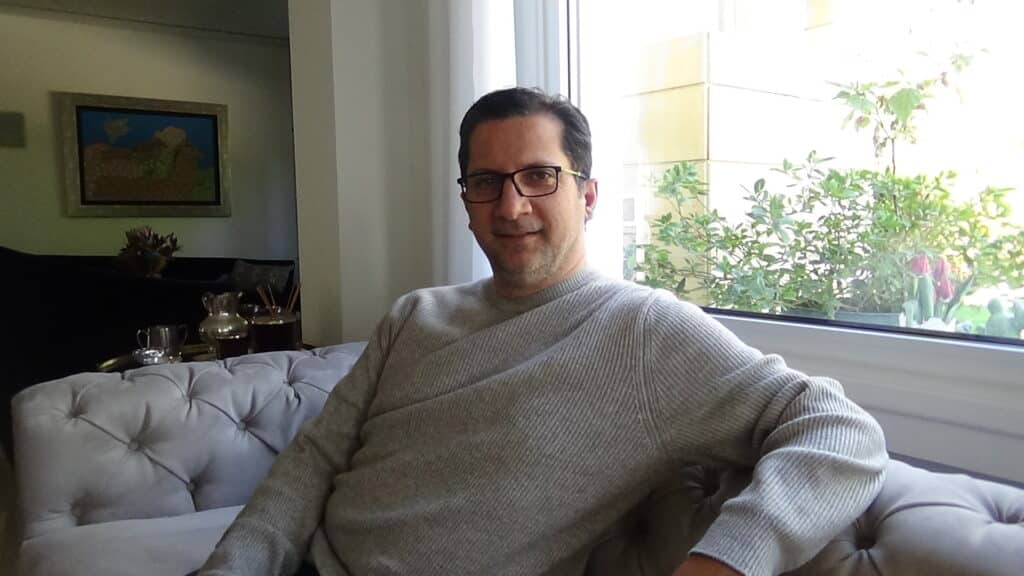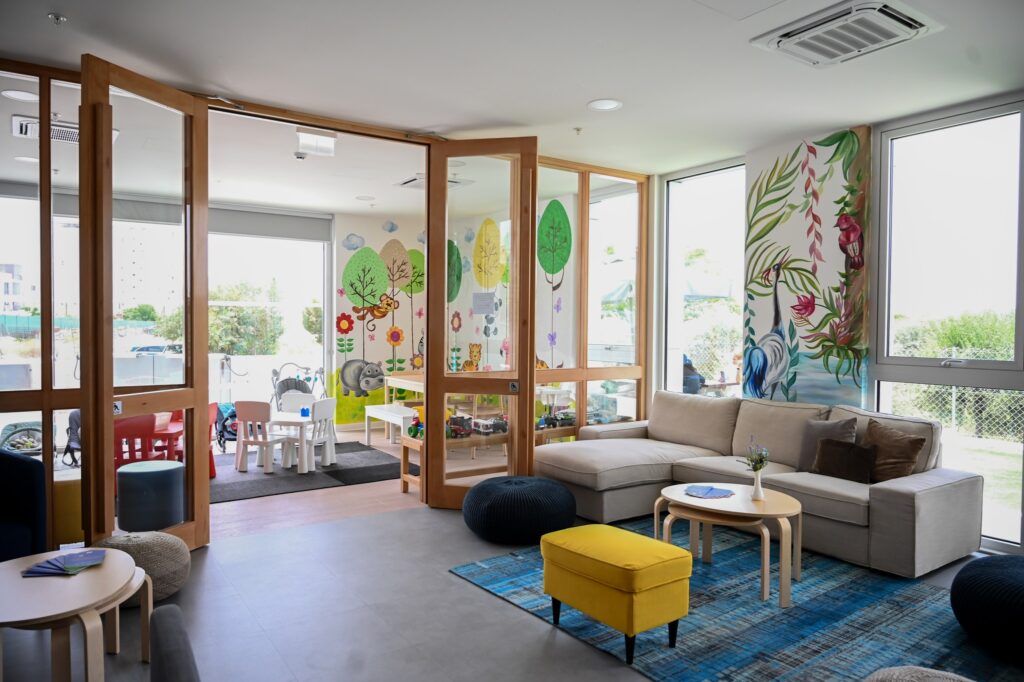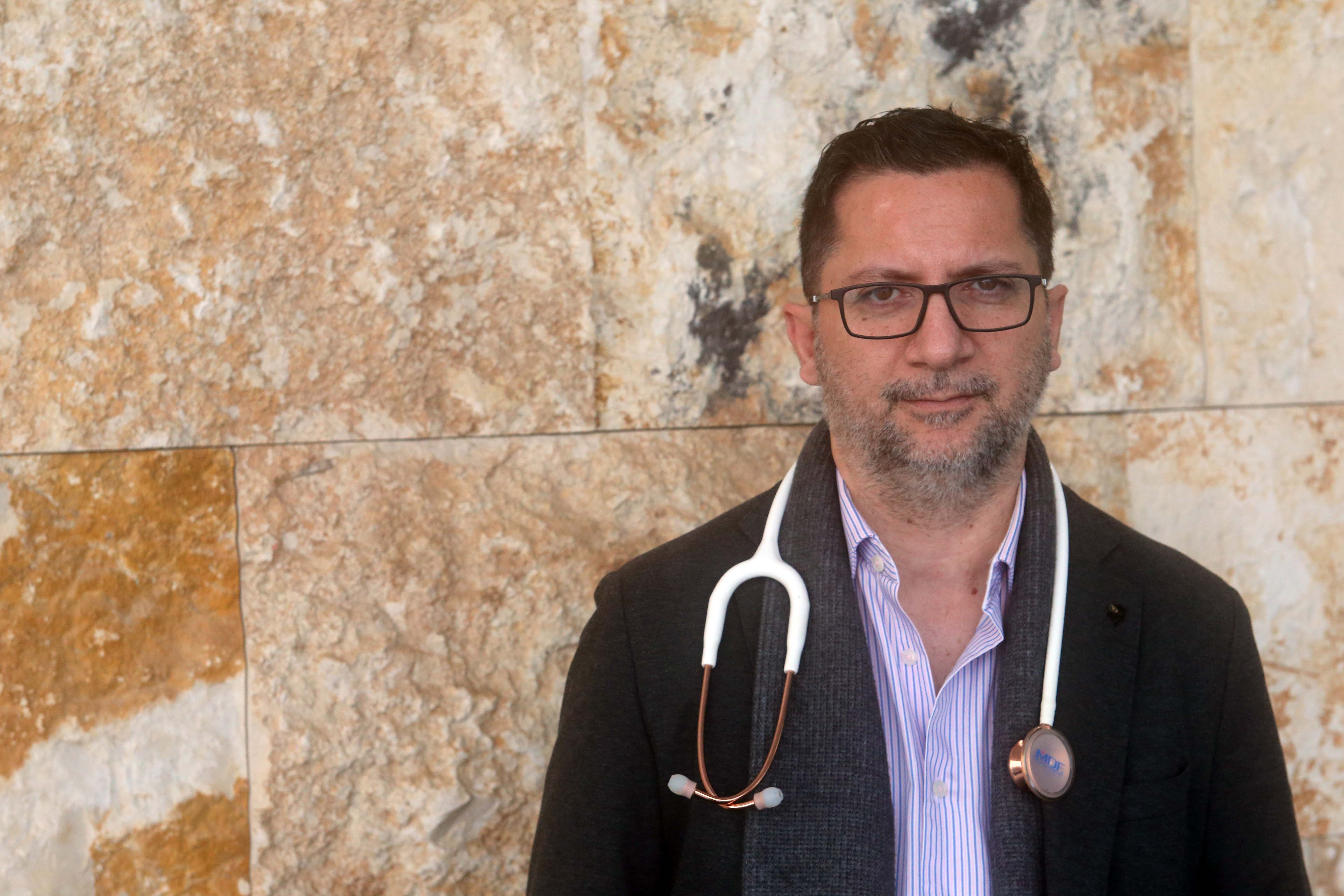In a roving oncologist, THEO PANAYIDES finds a socially conscious doctor who believes a positive mindset can help fight the bad vibes and worse of his days
“I had a patient in the UK who was on his deathbed,” recalls Dr George Astras. It was Saturday morning, and George was called into hospital – this was during his eight years in NHS hospitals, mostly in Bournemouth and London – because this end-of-life patient was suddenly very agitated, and insisted on seeing him.
“Listen George, I’m going to tell you something and I want you to do your best,” said the man. “I know I’m dying. I have a few hours left, my liver is giving up. Do whatever you have to do, and keep me alive for another few days… I need to live!” He explained that he’d just received a phone call from his daughter in the US. They’d fallen out, and hadn’t spoken in 20 years – but now she was coming to see him, to say goodbye.
George went to work, doing his best to delay the inevitable. “Needless to say, he lived,” he reports (or it wouldn’t be much of a story). “His daughter came. They had a couple of hours talking. They hugged, they told each other that they loved each other.” The daughter left, promising she’d be back soon, during official visiting hours (an exception had been made, under the circumstances). 20 minutes later, however, her father was dead, having managed to secure that precious little sliver of time with her.
Time is a recurring motif – both in our interview and indeed in George’s work as an oncologist, a cancer doctor. He recently attended an event to promote Ten Lanterns, a motivational book by Evagoras Evagorou, not just because he likes reading self-help books but also because he actually appears in this one – and the character based on George is called ‘Dr. Time’! “I am a surgeon, an oncologist,” is how he introduces himself in the book. “I try my best to help [my patients] live for another minute, another hour, another day.” Time is “my theme,” he tells me, sitting at the dining table of his Nicosia home on a Sunday morning. After all, “what does an oncologist do?”
Buys time?
“Exactly. He buys time for his patients.”

Of course, it also makes a difference to be satisfied with one’s life – not just to be 50, but also to feel like you’re where a 50-year-old ought to be. In that respect, too, Dr George seems fulfilled – or seems to have made good use of his time, shall we say. “I’ve done many things in my life. Helped lots of people. I created companies, helped with charities, I created cancer units…” He pauses, looking sly: “But I always say my greatest achievement is there,” he says, gesturing towards the next room. “My greatest achievement is over there, sitting at the computer.”
Bang on cue, the greatest achievement – his six-year-old son Angelos – barges in, wearing a Minecraft T-shirt and babbling excitedly about Blood Golems. Domestic life ripples around us on this quiet Sunday, the weekend life of a successful professional and family man. The suburban house is lavish and beautiful, with a swimming pool, a barbecue area, and an entire empty field behind the hedge where the previous occupant had set up a basketball court. Guests are arriving for lunch; George’s wife Paula meets them at the door, starts to organise the takeaway order, and very kindly asks me to stay. (I’m tempted, but decline.) At one point we pause for a domestic mini-crisis: a cage containing two singing lovebirds has been moved closer to the staircase – the birds were making too much noise – and a Scottish shorthair named Scarlett, one of two cats in the house (the other is Bella), is sniffing at the cage with a dangerous gleam in her eye.
There’s another, less domestic interruption: a message on his phone from George’s team, including the day’s patient reports and even X-rays for him to peruse. This is also part of the Sunday routine – though others usually take the weekend shifts, allowing him more time with the family. George is an entrepreneurial kind of doctor, not based out of any one hospital but offering oncology services at various places: the American Medical Centre and Platonas Medical Centre in Nicosia, Ygia Polyclinic in Limassol, and the St George Hospital in Paphos. “I employ 24 people right now,” he explains. “My team gets divided every day, and they go to different places.”
He was something of a pioneer, coming back from England in 2012 and pitching the idea of a private, specialised cancer unit (the recent additions in Limassol and Paphos were the first cancer units in those cities, outside of general hospitals). He comes off as an active, extroverted kind of doctor in general, the socially-conscious kind who helps with charities and gets involved in committees.

The Ronald McDonald house in Nicosia
He’s made speeches and presentations, including on unlikely subjects like the medical uses of cannabis. He was on the committee for the Ronald McDonald House project in Nicosia (built by RMHC, the charity arm of McDonalds), housing families whose kids are being treated at Makarios Hospital. At times, he can sound almost like a politician. “I had a discussion with a couple of ministers of health about this thing,” he says at one point (the ‘thing’ was Gesy, unsurprisingly) – or, a little later, “I was on TV the other day…”
Was he ambitious as a younger man? “Ambitious, but reserved,” he replies cautiously. “I didn’t want to – y’know, annoy anybody… I didn’t like conflict.” His style is amiable, as a doctor too (more on this later), yet he sets a high bar. “I have a thing in life – how can I say it, a motto. ‘We should all try to become better than our fathers.’ And each generation should be better than the last.”
His own father, an air-traffic controller by profession, left George’s mum and essentially abandoned the family when George was in his 20s – a tricky time, since he’d just finished medical school and suddenly found himself without work or money. (“I had some hard times.”) His choice of career had been made years earlier, in childhood – though in fact it was never a career, it’s a vocation. At one point I mention (somewhat tactlessly) that a doctor basically profits off people’s suffering – illness, after all, is his business – and George looks at me in a disappointed way, as if I’d spoiled the atmosphere with a coarse remark.
“No, we don’t do this for money,” he replies with dignity. “The majority of doctors – I say majority because we all know there’s a few who make it into a business – we do it because we want to help people… My calling since the age of five was to become a doctor.” The choice of oncology came later, when he lost the aforementioned friend at 19 (“plus everybody in my family dies from cancer”, he adds soberly) – a rewarding choice but also a harsh one, for the obvious reasons.
“Nobody deserves to get cancer,” he intones with feeling. “It’s a very cruel disease… Unfortunately, oncologists have a curse: we cannot cure everybody.”
I assume he has some stories, after 20-plus years in the field. “You want to hear good stories, or you want to hear sad stories? I have everything!” I ask for a sad one, and his choice is telling – the tale of a young man who came to George with his fiancée in tow. The man had advanced lung cancer, though he was only in his 30s. The three of them sat in George’s office, discussing possible treatments – then suddenly the fiancée stood up, “she said ‘I can’t handle it’, and she left. And he stayed in my office for about 20 minutes more”.
Two years passed; the young man received targeted therapy (a new kind of treatment) and was doing well, far better than expected. George asked if the fiancée was pleased. “He says to me, ‘George, I never told you. The day we came to see you, remember she stood up and left? Well, she went home and packed, and she left me!’. It took him two years to tell me this.” The story isn’t sad per se – the patient’s still alive, all these years later – but it’s a reminder of how cruel the disease can be, hitting loved ones almost as hard as the patient.
That fiancée gave up, though, that’s the sad part. Dr George is very clear on the fact – though it sounds slightly unscientific – that “having a positive mindset makes all the difference”. He sees it again and again, he tells me, “If a patient says ‘George, I’m going to fight this’, they do better. Because they’re more proactive, they want to eat, they go out with their loved ones, they walk around, they exercise – all these things contribute to better health. No matter what chemo you give them.”
That’s also why he lays such emphasis on a friendly style as a doctor, a good bedside manner. “That’s why I smile,” he replies with a smile, when I ask how he deals with being surrounded by bad vibes all day – but a smile is also medicinal, lifting the patient’s spirits and making them likelier to fight for that extra little bit of time. “We try to be very friendly with the patients. Sometimes we joke with them, during the treatment. It’s not all doom and gloom, y’know? – it’s not all death, not anymore. Cancer care has advanced to such levels that now even patients who are Stage Four may live on for many years… We’re winning the war against cancer. Step by step, slowly-slowly.”
That’s the good news, that we’ve moved on from clumsy old chemo. “When I started oncology, 20 years ago – 20-something years ago – we were telling everyone ‘you have three months to live, or six months, or a year’. Now I have a patient who’s been on targeted therapy for nine years. The first patient [in Cyprus] who received immunotherapy for lung cancer is my patient: 2016, and he’s still alive and well”. Immunotherapy is another new treatment, using drugs to boost the immune system and help the body heal itself.
That’s the good news; the bad is that, over the past two decades, there’s been a massive spike in cancers worldwide in a very specific group, the under-50s, which he puts down to nutrition and lifestyle. (Remember when we were young – he asks me – when cucumbers had a certain aroma? Even fruit and veg have become “more industrialised”.) It’s a gloomy irony that ‘Dr. Time’ is increasingly having to buy time for the young, who should really have all the time in the world.
Time is slippery, though; it wanes and waxes, it slips through your fingers. The story of the dad on his deathbed shows how even a tiny scrap of time can become all-important. He tells another story, of a case years ago when he got in a fender-bender and – for some reason – asked his colleagues to do a full CT scan of the other driver, instead of the neck MRI which was needed for insurance purposes; the scan showed stomach cancer, which would never have been caught otherwise. That’s a story of how time can expand as well as contract, through a kind of miraculous good luck. In the end, we can only do so much with our lives. Still, we have to try.
Dr George Astras tries – both through being active and dynamic, starting oncology units and working with charities, and through trying to be better generally, trying not to waste time. He eats healthy (“a bit of everything”), joins friends for futsal and spends time with family, bonding with the ‘great achievement’ of his middle years. “This is what every boy needs. Time with their father,” he declares, then smiles ruefully: “Because, not long [from now] – your father will be gone. So building good memories is the foundation of him having a stable future”. There it is again: time again, the passage of time and the end of time – and the constant human craving for that little extra smidgen of time.







Click here to change your cookie preferences